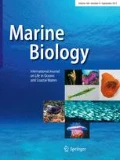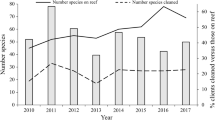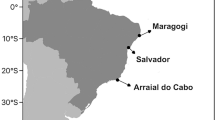Abstract
Many “client” coral reef fishes have their ectoparasites removed by the “cleaner” wrasse Labroides dimidiatus in mutualistic interactions. Clients regularly receiving cleaning services reportedly benefit from increased growth and cognitive performance, but the underlying physiological changes that covary with such benefits are unknown. Here, we tested whether reduced access to cleaning services affects physiological state in two species of damselfish, Amblyglyphidodon curacao and Acanthochromis polyacanthus. We performed an in situ removal experiment on the Great Barrier Reef, Australia, whereby 47% of cleaners on a natural reef were removed. Since cleaners occupy defined territories (called “cleaning stations”), this removal created areas where small, resident clients, including A. polyacanthus and A. amblyglyphidodon, had no access to cleaning services. One month following cleaner removal, we measured body condition and collected blood samples from both damselfish species from territories with and without access to cleaners. Blood was used for estimating haematocrit levels, hormonal analyses, and immune cell counts. We tested for correlations among all these parameters to explore potential trade-offs in terms of growth, aerobic capacity, immune activation, and/or reproduction as a result of the loss of cleaning benefits. In both species, we found that fish without access to cleaners had lower haematocrit, testosterone levels, and lymphocyte counts than fish with access. There were no significant changes in fish body condition, leukocytes, granulocytes, or plasma cortisol levels between fish with access to cleaners or not. However, testosterone levels correlated negatively with the proportion of granulocytes in the blood of fish with access to cleaners. Our results suggest that even a relatively short-term reduction in access to cleaning services can have negative physiological outcomes for clients. Thus, the presence of cleaners on coral reefs appears to have important benefits for coral reef fish community health.



Similar content being viewed by others
References
Águila S, Castillo-Briceño P, Sánchez M, Cabas I, García-Alcázar A, Meseguer J, Mulero V, García-Ayala A (2013) Specific and non-overlapping functions of testosterone and 11-ketotestosterone in the regulation of professional phagocyte responses in the teleost fish gilthead seabream. Mol Immunol 53:218–226. https://doi.org/10.1016/j.molimm.2012.08.002
Anderson RM, May RM (1981) The population dynamics of microparasites and their invertebrate hosts. Philos Trans R Soc Lond B Biol Sci 291:451–524
Barton BA (2002) Stress in fishes: a diversity of responses with particular reference to changes in circulating corticosteroids. Integr Comp Biol 42:517–525. https://doi.org/10.1093/icb/42.3.517
Barton BA, Schreck CB, Sigismondi LA (1986) Multiple acute disturbances evoke cumulative physiological stress responses in Juvenile Chinook Salmon. Trans Am Fish Soc 115:245–251. https://doi.org/10.1577/1548-8659(1986)115%3c245:MADECP%3e2.0.CO;2
Bayne CJ, Gerwick L (2001) The acute phase response and innate immunity of fish. Dev Comp Immunol 25:725–743. https://doi.org/10.1016/S0145-305X(01)00033-7
Binning SA, Ros AFH, Nusbaumer D, Roche DG (2015) Physiological plasticity to water flow habitat in the damselfish, Acanthochromis polyacanthus: Linking Phenotype to Performance. PLoS ONE 10:e0121983. https://doi.org/10.1371/journal.pone.0121983
Binning SA, Shaw AK, Roche DG (2017) Parasites and host performance: incorporating infection into our understanding of animal movement. Integr Comp Biol 57:267–280. https://doi.org/10.1093/icb/icx024
Binning SA, Roche DG, Grutter AS, Colosio S, Sun D, Miest J, Bshary R (2018) Cleaner wrasse indirectly affect the cognitive performance of a damselfish through ectoparasite removal. Proc R Soc B Biol Sci 285:20172447. https://doi.org/10.1098/rspb.2017.2447
Brantley RK, Wingfield JC, Bass AH (1993) steroid levels in porichthys notatus, a fish with alternative reproductive tactics, and a review of the hormonal bases for male dimorphism among teleost fishes. Horm Behav 27:332–347. https://doi.org/10.1006/hbeh.1993.1025
Bshary R (2001) The cleaner fish market. In: Noë R, Van Hooff JARAM, Hammerstein P (eds) Economics in nature: social dilemmas, mate choice and biological markets, Cambridge University Press, Cambridge, pp 146–172.
Bshary R (2003) The cleaner wrasse, labroides dimidiatus, is a key organism for reef fish diversity at Ras Mohammed national park. Egypt J Anim Ecol 72:169–176
Bshary R, Oliveira RF, Oliveira TS, Canário AV (2007) Do cleaning organisms reduce the stress response of client reef fish? Front Zool 4:21. https://doi.org/10.1186/1742-9994-4-21
Cheney KL, Côté IM (2005) Mutualism or parasitism? The variable outcome of cleaning symbioses. Biol Lett 1:162–165. https://doi.org/10.1098/rsbl.2004.0288
Chung J, Ou X, Kulkarni RP, Yang C (2015) Counting white blood cells from a blood smear using Fourier ptychographic microscopy. PLoS ONE 10:e0133489. https://doi.org/10.1371/journal.pone.0133489
Clague GE, Cheney KL, Goldizen AW, McCormick MI, Waldie PA, Grutter AS (2011) Long-term cleaner fish presence affects growth of a coral reef fish. Biol Lett 7:863–865. https://doi.org/10.1098/rsbl.2011.0458
Clark TD, Sandblom E, Jutfelt F (2013) Aerobic scope measurements of fishes in an era of climate change: respirometry, relevance and recommendations. J Exp Biol 216:2771–2782. https://doi.org/10.1242/jeb.084251
Core Team R (2017) A language and environment for statistical computing. R Foundation for Statistical Computing, Vienna
Cowlishaw M (2014) Determinants of home range and territory size in coral reef fishes. PhD thesis, James Cook University. http://researchonline.jcu.edu.au/40802/
Curtis-Quick JA, Ahmadia GN, Smith DJ (2012) Feeding plasticity of reef fish. In: Proceedings of the 12th international coral reef symposium, Cairns, Australia. pp 9–13
Davis AK, Maney DL, Maerz JC (2008) The use of leukocyte profiles to measure stress in vertebrates: a review for ecologists. Funct Ecol 22:760–772. https://doi.org/10.1111/j.1365-2435.2008.01467.x
Dean WRJ, MacDonald IAW (1981) A review of African birds feeding in association with mammals. Ostrich 52:135–155. https://doi.org/10.1080/00306525.1981.9633599
Ebert D, Lipsitch M, Mangin KL (2000) The effect of parasites on host population density and extinction: experimental epidemiology with Daphnia and six microparasites. Am Nat 156:459–477. https://doi.org/10.1086/303404
Ellis AE (1977) The leucocytes of fish: a review. J Fish Biol 11:453–491. https://doi.org/10.1111/j.1095-8649.1977.tb04140.x
Ezenwa VO (2004) Selective defecation and selective foraging: antiparasite behavior in wild ungulates? Ethology 110:851–862. https://doi.org/10.1111/j.1439-0310.2004.01013.x
Félix AS, Faustino AI, Cabral EM, Oliveira RF (2013) Noninvasive measurement of steroid hormones in zebrafish holding-water. Zebrafish 10:110–115. https://doi.org/10.1089/zeb.2012.0792
Grutter AS (1994) Spatial and temporal variations of the ectoparasites of seven reef fish species from Lizard Island and Heron Island, Australia. Mar Ecol Prog Ser 115:21–30
Grutter AS (1996) Parasite removal rates by the cleaner wrasse Labroides dimidiatus. Mar Ecol Prog Ser 130:61–70. https://doi.org/10.3354/meps130061
Grutter A, Pankhurst NW (2000) The effects of capture, handling, confinement and ectoparasite load on plasma levels of cortisol, glucose and lactate in the coral reef fish Hemigymnus melapterus. J Fish Biol 57:391–401. https://doi.org/10.1006/jfbi.2000.1312
Grutter BMD, Bshary R, Cheney KL, Cribb TH, Madin EMP, McClure EC, Meekan MG, Sun D, Warner RR, Werminghausen J (2018) Sikkel PC (2017) Parasite infestation increases on coral reefs without cleaner fish. Coral Reefs 37:15–24. https://doi.org/10.1007/s00338-017-1628-z
Grutter AS (1995) Relationship between cleaning rates and ectoparasite loads in coral reef fishes. Mar Ecol Prog Ser 118:51–58
Grutter AS (1999) Cleaner fish really do clean. Nature 398:672–673
Grutter AS (2003) Feeding ecology of the fish ectoparasite Gnathia sp. (Crustacea: Isopoda) from the Great Barrier Reef, and its implications for fish cleaning behaviour. Mar Ecol Prog Ser 259:295–302
Hart BL (1990) Behavioral adaptations to pathogens and parasites: five strategies. Neurosci Biobehav Rev 14:273–294. https://doi.org/10.1016/S0149-7634(05)80038-7
Hu G-X, Lian Q-Q, Lin H, Latif SA, Morris DJ, Hardy MP, Ge R-S (2008) Rapid mechanisms of glucocorticoid signaling in the Leydig cell. Steroids 73:1018–1024. https://doi.org/10.1016/j.steroids.2007.12.020
Hutchings MR, Gordon IJ, Kyriazakis I, Jackson F (2001) Sheep avoidance of faeces-contaminated patches leads to a trade-off between intake rate of forage and parasitism in subsequent foraging decisions. Anim Behav 62:955–964. https://doi.org/10.1006/anbe.2001.1837
Hutchins M, Barash DP (1976) Grooming in primates: Implications for its utilitarian function. Primates 17:145–150. https://doi.org/10.1007/BF02382848
Jones CM, Grutter AS (2005) Parasitic isopods (Gnathia sp.) reduce haematocrit in captive blackeye thicklip (Labridae) on the Great Barrier Reef. J Fish Biol 66:860–864
Jones JG, Holland BM, Hudson IRB, Wardrop CAJ (1990) Total circulating red cells versus haematocrit as the primary descriptor of oxygen transport by the blood. Br J Haematol 76:288–294. https://doi.org/10.1111/j.1365-2141.1990.tb07886.x
Kilham L (1982) Cleaning/feeding symbioses of common crows with cattle and feral hogs. J Field Ornithol 53:275–276
Kingsford MJ, Hughes JM (2005) Patterns of growth, mortality, and size of the tropical damselfish Acanthochromis polyacanthus across the continental shelf of the Great Barrier Reef. Fish Bull 103:561–573
Kurtz J, Kalbe M, Langefors Å, Mayer I, Milinski M, Hasselquist D (2007) An experimental test of the immunocompetence handicap hypothesis in a teleost fish: 11-ketotestosterone suppresses innate immunity in three-spined sticklebacks*. Am Nat 170:509–519. https://doi.org/10.1086/521316
Losey GS Jr (1979) Fish cleaning symbiosis: proximate causes of host behaviour. Anim Behav 27:669–685
MacFarland CG, Reeder WG (1974) Cleaning symbiosis involving Galapagos tortoises and two species of Darwin’s finches. Z Für Tierpsychol 34:464–483. https://doi.org/10.1111/j.1439-0310.1974.tb01816.x
Mooring MS, Hart BL (1992) Animal grouping for protection from parasites: selfish herd and encounter-dilution effects. Behaviour 123(3–4):173–193. https://doi.org/10.1163/156853992X00011
Pankhurst NW (2011) The endocrinology of stress in fish: An environmental perspective. Gen Comp Endocrinol 170:265–275. https://doi.org/10.1016/j.ygcen.2010.07.017
Pankhurst NW, Hilder PI, Pankhurst PM (1999) Reproductive condition and behavior in relation to plasma levels of gonadal steroids in the Spiny damselfish Acanthochromis polyacanthus. Gen Comp Endocrinol 115:53–69. https://doi.org/10.1006/gcen.1999.7285
Randall JE, Allen GR, Steene RC (1997) Fishes of the Great Barrier Reef and Coral Sea. University of Hawaii Press
Ros AFH, Lusa J, Meyer M, Soares M, Oliveira RF, Brossard M, Bshary R (2011) Does access to the bluestreak cleaner wrasse Labroides dimidiatus affect indicators of stress and health in resident reef fishes in the Red Sea? Horm Behav 59:151–158. https://doi.org/10.1016/j.yhbeh.2010.11.006
Saha NR, Usami T, Suzuki Y (2003) A double staining flow cytometric assay for the detection of steroid induced apoptotic leucocytes in common carp (Cyprinus carpio). Dev Comp Immunol 27:351–363. https://doi.org/10.1016/S0145-305X(02)00116-7
Sangalang GB, Freeman HC, Flemming RB (1978) A simple technique for determining the sex of fish by radioimmunoassay using 11-ketotestosterone antiserum. Gen Comp Endocrinol 36:187–193. https://doi.org/10.1016/0016-6480(78)90021-7
Schreck CB (2010) Stress and fish reproduction: the roles of allostasis and hormesis. Gen Comp Endocrinol 165:549–556. https://doi.org/10.1016/j.ygcen.2009.07.004
Sheldon BC, Verhulst S (1996) Ecological immunology: costly parasite defences and trade-offs in evolutionary ecology. Trends Ecol Evol 11:317–321. https://doi.org/10.1016/0169-5347(96)10039-2
Sikkel PC, Richardson MA, Sun D, Narvaez P, Feeney WE, Grutter AS (2019) Changes in abundance of fish-parasitic gnathiid isopods associated with warm-water bleaching events on the northern Great Barrier Reef. Coral Reefs 38:721–730. https://doi.org/10.1007/s00338-019-01835-3
Slater CH, Schreck CB (1993) Testosterone alters the immune response of Chinook salmon, Oncorhynchus tshawytscha. Gen Comp Endocrinol 89:291–298. https://doi.org/10.1006/gcen.1993.1035
Slater CH, Schreck CB (1997) Physiological levels of testosterone Kill salmonid leukocytes in vitro. Gen Comp Endocrinol 106:113–119. https://doi.org/10.1006/gcen.1996.6858
Slater CH, Fitzpatrick MS, Schreck CB (1995) Characterization of an androgen receptor in salmonid lymphocytes: possible link to androgen-induced immunosuppression. Gen Comp Endocrinol 100:218–225. https://doi.org/10.1006/gcen.1995.1151
Small M, Lowe GDO, Cameron E, Forbes CD (1983) Contribution of the haematocrit to the bleeding time. Pathophysiol Haemost Thromb 13:379–384. https://doi.org/10.1159/000214826
Sopinka NM, Donaldson MR, O’Connor CM, Suski CD, Cooke SJ (2016) Stress indicators in fish. Fish physiology. Elsevier, Amsterdam, pp 405–462
Sun D, Cheney KL, Werminghausen J, Meekan MG, McCormick MI, Cribb TH, Grutter AS (2015) Presence of cleaner wrasse increases the recruitment of damselfishes to coral reefs. Biol Lett 11:20150456. https://doi.org/10.1098/rsbl.2015.0456
Triki Z, Grutter AS, Bshary R, Ros AFH (2016) Effects of short-term exposure to ectoparasites on fish cortisol and hematocrit levels. Mar Biol. https://doi.org/10.1007/s00227-016-2959-y
Triki Z, Wismer S, Levorato E, Bshary R (2018) A decrease in the abundance and strategic sophistication of cleaner fish after environmental perturbations. Glob Change Biol 24:481–489. https://doi.org/10.1111/gcb.13943
Van Weerd JH, Komen J (1998) The effects of chronic stress on growth in fish: a critical appraisal. Comp Biochem Physiol A Mol Integr Physiol 120:107–112. https://doi.org/10.1016/S1095-6433(98)10017-X
Wagner ELES, Roche DG, Binning SA, Wismer S, Bshary R (2015) Temporal comparison and predictors of fish species abundance and richness on undisturbed coral reef patches. PeerJ 3:e1459. https://doi.org/10.7717/peerj.1459
Waldie PA, Blomberg SP, Cheney KL, Goldizen AW, Grutter AS (2011) Long-term effects of the cleaner fish Labroides dimidiatus on coral reef fish communities. PLoS ONE 6:e21201. https://doi.org/10.1371/journal.pone.0021201
Weyts FAA, Flik G, Kemenade BMLV (1998) Cortisol inhibits apoptosis in carp neutrophilic granulocytes. Dev Comp Immunol 22:563–572. https://doi.org/10.1016/S0145-305X(98)00027-5
Acknowledgements
We thank the staff of LIRS for their support and friendship; Dr Albert Ros for help with the blood smear analyses; Radu Slobodeanu for help with the statistical analyses; and Jennifer McClung for commenting on an earlier version of the manuscript. SAB is funded through the Natural Sciences and Engineering Research Council of Canada and the Canada Research Chair program. This project was funded by the Swiss National Science Foundation (grant number 31003A_153067/1 to R.B.).
Author information
Authors and Affiliations
Contributions
RB, ZT and CD conceived the study. ZT, CD, DGR and SAB finalized data collection design. CD and ZT collected the data with assistance from DGR and SAB. GG performed the HPLC-MS analyses. ZT ran statistical analyses and generated the figures. ZT and CD wrote the first draft of the manuscript, and ZT incorporated comments from all co-authors.
Corresponding author
Ethics declarations
Conflict of interest
All authors declare that they have no conflict of interest.
Ethical standards
The Animal Ethics Committee of the Queensland government (DAFF) approved the project (CA 2015/06/869).
Additional information
Communicated by K. D. Clements.
Publisher's Note
Springer Nature remains neutral with regard to jurisdictional claims in published maps and institutional affiliations.
Reviewed by A. S. Grutter and an undisclosed expert
Electronic supplementary material
Below is the link to the electronic supplementary material.
Rights and permissions
About this article
Cite this article
Demairé, C., Triki, Z., Binning, S.A. et al. Reduced access to cleaner fish negatively impacts the physiological state of two resident reef fishes. Mar Biol 167, 48 (2020). https://doi.org/10.1007/s00227-020-3658-2
Received:
Accepted:
Published:
DOI: https://doi.org/10.1007/s00227-020-3658-2




